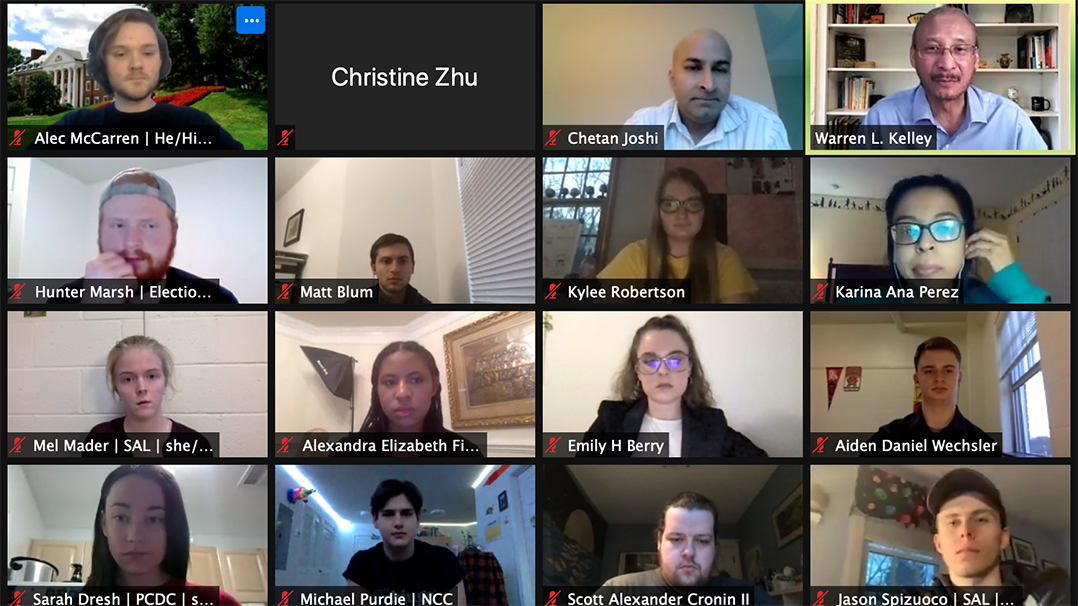Dr. Chetan Joshi, director of the University of Maryland’s Counseling Center, spoke to the RHA Senate about mental health support and accessibility and disability services at a Tuesday meeting.
In his first statement as university president, Darryll Pines outlined 12 initiatives geared toward improving student experiences on the campus. His first goal was to increase staffing for mental health services.
Joshi said he submitted a proposal to streamline mental health services and improve accessibility at the end of the fall semester.
The proposal advocated for the creation of a rapid access team designed to make mental health services more accessible to students, Joshi said. The initiative includes drop-in consultation to allow for immediate meetings, as well as a 35-minute single therapy session to help students find solutions to problems.
In single-session therapy, counseling services follow up with students after two weeks to see if the solution has been effective. The University of Connecticut has experimented with this method, Joshi said, and out of 218 sessions, only about 12 to 15 students came back for additional help.
The proposal also calls for the establishment of a case management team to help students who have been hospitalized due to mental health concerns transition back into an academic environment.
[UMD Counseling Center director discusses mental health support initiatives at SGA meeting]
Sen. Kylee Robertson voiced support for a case management team and suggested creating a support group for these students, which would include other students who have stayed in the hospital for mental health treatment.
“It’s absolutely such a big transition going from [a hospital] environment, whether short-term or long-term, into an academic environment,” the sophomore psychology major said.
The proposal also seeks to create a single entry point for counseling services and behavioral health services, Joshi explained. An internal process would help students know where to go, he added.
“I’ve heard students talk about how they feel confused as to, ‘When do I need to go to BHS? When do I need to go to the counseling service?’” Joshi said. “When they come to counseling services, everything is free, whereas when they go to BHS, [it’s] their insurance system, so it gets confusing and complicated quickly.”
[RHA votes to support state bill requiring UMD to be carbon neutral by 2035]
Joshi expects it will take four to five months for Pines and leadership to review the proposal in detail. If approved, it will hopefully take between a year and a half to two years to implement the plans, though it could be longer, he said.
Accessibility and disability services also exist under the Counseling Center umbrella, Joshi said.
Prior to the pandemic, accessibility and disability services made an effort to create proctored exam locations for students with accommodations, said Dr. Warren Kelley, senior associate vice president for student affairs. But with online classes, instructors are able to use ELMS to customize testing to accommodate students.
Warren considered continuing this practice when classes return in person but recognized possible complaints.
“It seemed like such a great technological advancement, but I’ve heard that once we have students back in physical classes face-to-face taking an exam, you can’t let some of those students take the test online — it’s inconsistent, unfair testing, in a way,” he said. “We’ll have to think about how we ensure we’re providing all of the proper tests and accommodations we need to provide.”
Joshi said a silver lining to the pandemic is that people have learned to make education more accessible. Moving forward, Joshi said the goal is to figure out how to maintain aspects of accessibility in person.
“Oftentimes faculty will react by saying ‘You’re just taking time to take advantage of the system,’ and that’s not the point,” Joshi said. “The point is that we’re trying to equalize the playing fields.”



